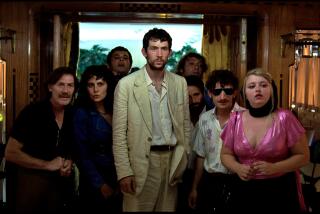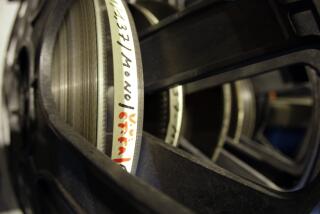Revisiting John Cassavetes’ groundbreaking films
John Cassavetes’ name has become a kind of shorthand over the years. Filmmakers and critics tend to invoke it whenever hand-held close-ups zero in on characters who are drunk, distraught, dissembling, divulging their innermost fears or all of the above. What’s missing from many such interpretations of so-called Cassavetian cinema is an appreciation of the singular compassion and acuity of a visionary.
In the quarter-century since his death at 59, Cassavetes’ uncategorizable work has lost none of its breathtaking intensity. Yet an admirer might return to the films with some trepidation; for all their rough beauty, they’re not easy viewing, as one would expect from a filmmaker who said with typical exuberance, “I hate entertainment.”
Criterion Collection’s recent release on Blu-ray of its 2004 DVD set “John Cassavetes: Five Films” provides an opportunity to revisit some of his groundbreaking work in all its digitally restored vérité glory. There’s a real kick in recognizing that the rewards of the movies deepen with the years, resonating anew with the viewer’s own experience. In many ways, we’re still catching up with Cassavetes. As his friend and collaborator Peter Falk said in one of the Criterion set’s interviews, “He saw the dawn about an hour before everybody else.”
Falk, who appeared in three Cassavetes films, was part of the troupe that the director gathered around him for his do-it-yourself moviemaking mission. In various configurations, the core company included Seymour Cassel, Ben Gazzara and Cassavetes’ off-screen partner, Gena Rowlands, who brought an assortment of magnificently thorny characters to life in her husband’s films.
They formed a kind of extended family: the self-taught director, his self-taught crew and the performers, trained and untrained alike (Cassavetes hated the distinction between professional and amateur). United in a joyous, serious struggle, they rehearsed, shared spaghetti dinners and, sometimes, waited out breaks in shooting when the money was gone.
Among the acting jobs that helped to pay for his personal projects was “Rosemary’s Baby,” in which he played an actor who pursued success at any cost. In contrast, Cassavetes, rather than accept studio lucre, availed himself of lines of credit and remortgaged his and Rowlands’ home, more than once.
For his first feature, the New York-set 1959 drama “Shadows,” he employed a sort of ur-Kickstarter, appealing to listeners of Jean Shepherd’s radio show for contributions. The film itself, with its Beat vibe and improvisatory energy, grew out of an acting workshop Cassavetes led. Its depiction of multiracial characters and interracial relationships was as fresh at the time as its dynamic location shooting in Manhattan, but what’s most striking about the film is its grasp of female experience, as scripted by Cassavetes and performed by dancer turned actress Lelia Goldoni in the central role.
PHOTOS: Behind the scenes of movies and TV
Cassavetes’ complex, full-blooded female characters are no less extraordinary today than when he wrote them. In addition to “Shadows,” “Five Films” includes a trio of stunning examples, all starring Rowlands: “Faces” (1968), “A Woman Under the Influence” (1974) and “Opening Night” (1977).
“Faces” is a mesmerizing study of marital disillusion and the dawning of self-knowledge in middle age. Among its indelible performances is secretary turned actress Lynn Carlin’s Oscar-nominated screen debut and the devastating turn by silent film star Dorothy Gulliver as an aging suburbanite. No other movie has captured the hollow ring of desperate laughter so unflinchingly.
Cassavetes had no interest in the evasions and soft reassurances of conventional screen romance. Instead we get the robust and heartbreaking dance between Rowlands’ troubled Mabel and Falk’s ill-equipped Nick in “A Woman Under the Influence” and Rowlands’ stage star Myrtle Gordon facing down her demons in gorgeously messy, heroic fashion in “Opening Night.”
Handling a good deal of the signature camera work himself, Cassavetes doesn’t just observe but aligns himself with every embarrassing and cruel moment in his stories, never tipping into the maudlin. His love for his characters is real.
PHOTOS: Behind-the-scenes Classic Hollywood
A diverse bunch, they’re all in free fall but holding on. Strip-club owner Cosmo Vitelli, in “The Killing of a Chinese Bookie,” lands in hot water with loan sharks, his life and business imperiled, but the show must go on — an old-school, corny burlesque extravaganza, while the free-love storm swirls outside his Sunset Strip doors.
Though not as well known as some of Cassavetes’ other works, “Bookie” is perhaps his most personal film and one of his most affecting. It was a film that Cassavetes said he could have made again and again. The Criterion set includes the two versions he did make: the original 1976 release and the shorter cut from two years later, which has a steelier edge and lacks many of the grace notes that give the first edition its novelistic depth.
What at first appears to be an exercise in screw-tightening noir is something else entirely. It took Ben Gazzara, who’s stupendous as Cosmo, awhile to see beyond the genre surface. Well into the shoot, which began two weeks after Cassavetes wrote the script, Gazzara understood that “this picture was not a gangster picture at all,” as he put it in a 2004 interview. “This picture was about John … about the struggle — his struggle — to remain an artist.”
Cassavetes spoke of the art-versus-business equation as a matter of life or death. That’s how he lived it too, and it’s why no serious discussion of independent moviemaking is complete without him. In an age of studio-bankrolled “indies,” Cassavetes’ work still represents the real, gutsy deal. Emulators may get the intimacy and kinetics of his sensibility. Few approach the disciplined artistry of his movies’ seeming formlessness, or their sheer, bracing life force.
More to Read
Only good movies
Get the Indie Focus newsletter, Mark Olsen's weekly guide to the world of cinema.
You may occasionally receive promotional content from the Los Angeles Times.






